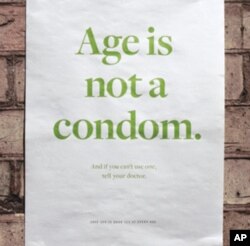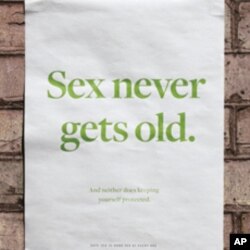Most people think of HIV/AIDS as a young person's disease but the U.S. Centers for Disease Control predicts that - five years from now - half of Americans with HIV/AIDS will be at least 50 years old. Most of them will be people who've survived into their fifties, thanks to effective drugs.
But the number of people who are contracting HIV at age 50 or older went up 16 percent between 2005 and 2008. Researchers worry it will keep rising unless this age group starts thinking about prevention.
'Sex never gets old'
Jane Fowler never used to talk about sex. Like most people born in the 1930s, the subject was pretty much off-limits. But she's spent the last 15 years traveling the country, warning older adults about the dangers of unprotected sex. When she was in her early fifties, she tells them, she was trying to get her life back on track after a painful divorce.
"So I started to date. I was dating for the first time in 25 years and we're talking the mid-1980s," says Fowler. "I didn't know what was out there. I knew I couldn't get pregnant."
So she didn't even think about using condoms. She started seeing an old family friend who was also divorced. A few years after their relationship fizzled, she applied for a new health insurance plan. She was asked to take a blood test. That's how she found she was HIV-positive.
Dr. Steve Karpiak is director of research for ACRIA, the AIDS Community Research Initiative of America. He says older women are not the only ones to be shocked by the diagnosis.
"I mean there's not a month that goes by we hear about, it could be a 70, 80, even early 90-year-old woman, who's suddenly, they think something's wrong with her and no one thinks to test for HIV until they're way into the diagnostic process."
Talking prevention
Karpiak says although more men than women contract the virus, women are particularly vulnerable. Many women who've gone through menopause see no need to protect themselves during sex. But for physiological reasons, women are more susceptible to sexually transmitted diseases as they age. Karpiak says few doctors talk to older patients about their sex lives, or the dangers of STDs, including HIV.
But Ed Shaw is trying to get that message out. He was diagnosed with HIV in his 40s, and more than two decades later, looks far younger than his 69 years. Like Jane Fowler, he's still alive thanks to a daily regimen of anti-retroviral drugs. He heads the New York Association of HIV Over 50. For the last few years he's been speaking at New York City senior centers.
"You'd be surprised how many folks don't know some of the basics about HIV," says Shaw.
Shaw usually doesn't reveal he's HIV-positive until the end of his talk. He recalls one woman who approached him after a session.
"She says 'You know Mr. Shaw, if you didn't have that thing I'd take you home with me right now.' I said 'That's the very reason why I'm saying you need to know the status of your partner.'"
Shaw encourages everyone in his audience to get tested.
HIV rates are 12 times higher among blacks than they are among whites. AIDS activist and former music promoter Maria Davis is 51. She's been living with the virus for 15 years. She says there's still a lot of ignorance about the disease in her African-American community.
"People are still saying if somebody eats off your fork, they can get AIDS or HIV, or if somebody goes in the bathroom behind you," says Davis. "I mean I have people asking me those kinds of questions."
There are stumbling blocks when it comes to discussing older people and HIV prevention.
"People think older people don't have sex. I don't know what they thinking about," says Davis who has talked to young people who cannot imagine their grandparents having sex. "They're human beings like you, and one day you'll be old too. Everybody wants affection. Everybody wants companionship."
And, Davis says, everybody needs to protect themselves once they find those things.
High costs
The growing number of infected people in their fifties and sixties also presents a new challenge for the U.S. health system.
Older people are costly to treat anyway, but those with HIV or AIDS will be far more so. And this is not just a problem for the U.S. UN AIDS estimates that globally, around 11 percent of the more than 33 million people with HIV are 50 and over. That's up from seven percent earlier this decade.
Dr. Steve Karpiak of ACRIA says living with the virus in an aging body means coping with health complications such as heart conditions, cancer, hypertension and osteoporosis.
"You're 55 on your birth certificate but clinically you look like you're 80," he says, adding that a prevention campaign aimed at older people is overdue. Karpiak believes the more people of all ages talk about sex and HIV, the likelier it is the number of new cases will start to drop.









